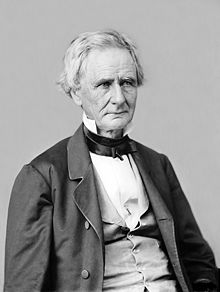Simon Cameron | |
|---|---|
 Cameron, c. 1860–1870 | |
| United States Senator from Pennsylvania | |
| In office March 4, 1867 – March 12, 1877 | |
| Preceded by | Edgar Cowan |
| Succeeded by | J. Donald Cameron |
| In office March 4, 1857 – March 4, 1861 | |
| Preceded by | Richard Brodhead |
| Succeeded by | David Wilmot |
| In office March 13, 1845 – March 3, 1849 | |
| Preceded by | James Buchanan |
| Succeeded by | James Cooper |
| United States Minister to Russia | |
| In office June 25, 1862 – September 18, 1862 | |
| President | Abraham Lincoln |
| Preceded by | Cassius Clay |
| Succeeded by | Cassius Clay |
| 26th United States Secretary of War | |
| In office March 5, 1861 – January 14, 1862 | |
| President | Abraham Lincoln |
| Preceded by | Joseph Holt |
| Succeeded by | Edwin Stanton |
| Personal details | |
| Born | March 8, 1799 Maytown, Pennsylvania, U.S. |
| Died | June 26, 1889 (aged 90) Maytown, Pennsylvania, U.S. |
| Resting place | Harrisburg Cemetery |
| Political party | Democratic (before 1849) American (1849–1856) Republican (1856–1877) |
| Spouse |
Margaret Brua (m. 1822) |
| Children | 10, including J. Donald |
| Signature | |
Simon Cameron (March 8, 1799 – June 26, 1889)[1] was an American businessman and politician who represented Pennsylvania in the United States Senate and served as United States Secretary of War under President Abraham Lincoln at the start of the American Civil War.
A native of Maytown, Pennsylvania, Cameron made a fortune in railways, canals, and banking.[2] He was elected to the United States Senate as a member of the Democratic Party in 1845. A persistent opponent of slavery, Cameron briefly joined the Know Nothing Party before switching to the Republican Party in 1856. He won election to another term in the Senate in 1857 and provided pivotal support to Abraham Lincoln at the 1860 Republican National Convention.
Lincoln appointed Cameron as his first Secretary of War. Cameron's wartime tenure was marked by allegations of corruption and lax management, and he was demoted to Ambassador to the Russian Empire in January 1862. Cameron made a political comeback after the Civil War, winning a third election to the Senate in 1867 and building the powerful Cameron machine, which would dominate Pennsylvania politics for the next 70 years.
- ^ Baker, Jean (1999). "Cameron, Simon". American National Biography. New York: Oxford University Press. doi:10.1093/anb/9780198606697.article.0400195. (subscription required)
- ^ "Cameron, Fritchie are luminaries of era". Intelligencer Journal. February 7, 2011. Retrieved November 11, 2016.